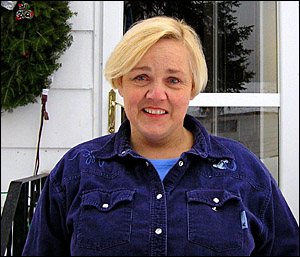 |
 |

|
||
| part: 1 2 3 4
5 6 |
||
| They Needed the Jobs |
||
“I said, ‘Who is that?’” says Aho. “I didn’t know there were any other women active in the unions and I was getting active in Minntac union. I got to know her and we went to union school together and we got to be good friends.” Jeannie Aho’s new friend was Pat Kosmach. She worked at a different mine, Eveleth Mines. At union school, they learned how to negotiate, and how to handle problems on the job – though no one ever mentioned dealing with sexual harassment. Pat Kosmach is dead now, but Jeannie Aho remembers being shocked by her friend’s troubles with some of the men at the mines. “She saw things that I never had to put up with,” Aho says. “She used to tell me all the stuff that was going on. You know, when it started nobody had ever heard of going to court and suing because of it. Nobody really knew what do to. We just thought well you had to take it because you were in a man’s world.” In fact, when women started working in the mines, it was perfectly legal for men to try to make their female co-workers so miserable that they would quit. The women had never heard of anyone suing over it because no one had ever done it. University of Colorado law professor Melissa Hart says Title 9 had made sex discrimination illegal in 1964. But at first, the law didn't cover harassment. "It wasn't until the mid 70s that the notion that sexual harassment could be discrimination was recognized," Hart says. And Hart says at first, sexual harassment had a narrow definition. Essentially, a woman could only sue for harassment if her boss demanded sex from her and fired her when she said no. “It wasn’t until the 80s that courts started looking at the notion that a work environment that was pervaded by sexual harassment could be sex discrimination, even if no firing occurred,” Hart says. So at first, the women at the mines had two choices. Put up with it, or quit. Aho says her friend Pat Kosmach was divorced and needed to support her kids. “She said she’d be damned if she’d quit,” Aho says. “This was the best paying job she’d ever had.” Before they got work at the mines, Kosmach had been a cocktail waitress and Aho had been a hairdresser. Aho says there weren’t jobs for women on the Range that paid the way the mines did, or offered health benefits. Women who got those jobs found themselves suddenly independent. Many were able to leave bad marriages, or not get married at all. Denise Vesel says when she was a child, she saw her mom beg her dad for money. She never wanted to depend on a man like that. So she was thrilled to get hired at Eveleth Mines. “Growing up with six kids in a family there wasn’t really money for much and it’s like now I have complete freedom of doing what I want,” she says. “I can buy ten t-shirts if I want. I don’t have to go buy them on sale. I can do what I want. And it felt so great just to go to a store and whip out the money and pay for it. Or buy a new pair of boots when you want or buy a couple pairs of jeans and don’t have to ask permission.” |
||
Next: They Needed the Jobs - part 2 |
